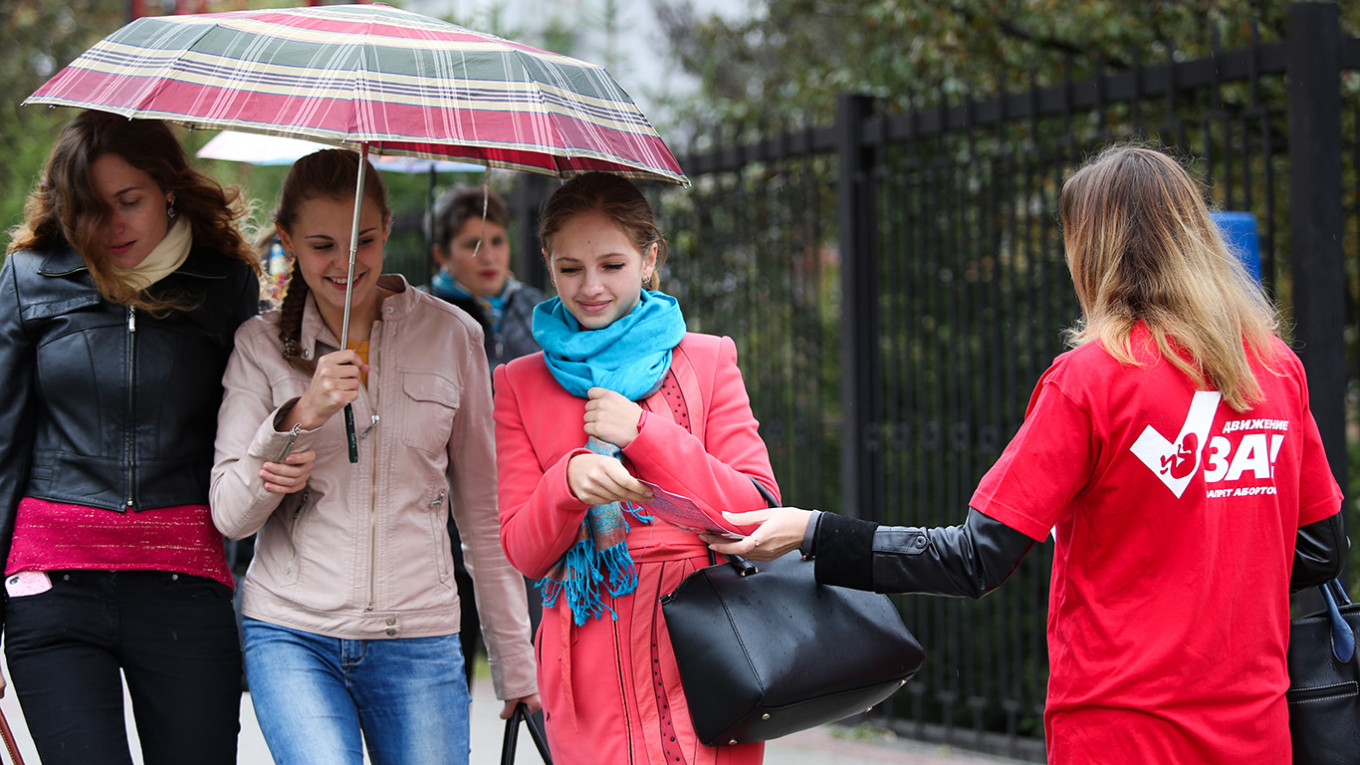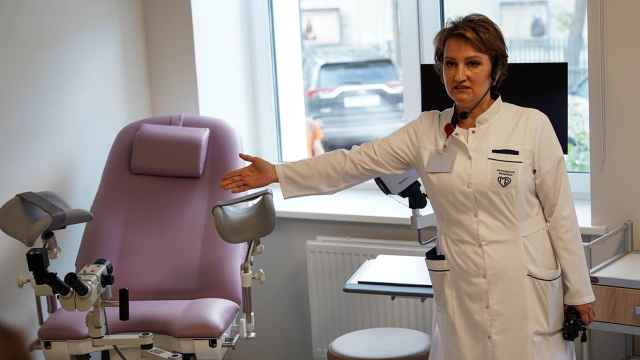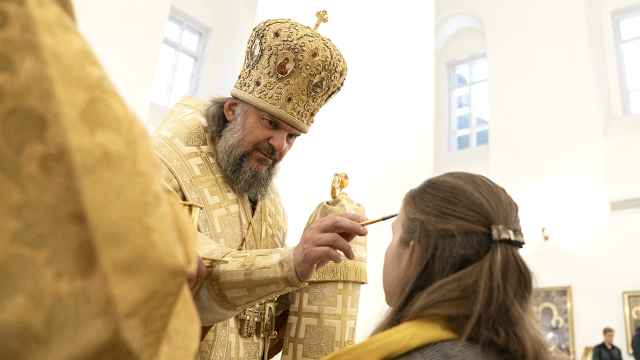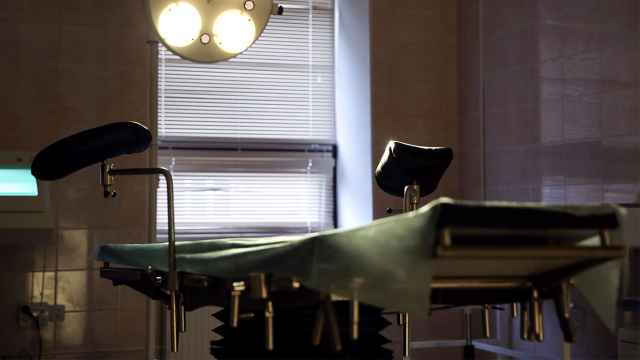Women’s rights activists across the globe on Saturday marked International Safe Abortion Day.
But for many in Russia, the occasion was a bitter reminder of how far the country’s government has backtracked on its once-liberal abortion policies, leaving thousands of women with increasingly limited access to safe, affordable and timely abortion care.
This week, the Far East Primorye region became the 11th Russian region to outlaw “coercion” into abortion, a term that encompasses actions such as persuasion, bribery, deceit, blackmail or workplace pressure that compel women to terminate a pregnancy.
And lawmakers in Russia’s lower house State Duma have started considering a bill that would outlaw the so-called “childfree movement” and make the publication of content that “popularizes childlessness” punishable by a fine of up to 5 million rubles ($54,024).
Independent lawyers warn that some provisions of the anti-childfree law contradict the Constitution and could put contraception producers advertising their products — or ordinary women sharing stories of difficult childbirth experiences — at risk of a fine.
"The state's policy on abortion did not change overnight. The pressure has been gradually increasing throughout Vladimir Putin's rule," said a feminist activist from Russia who requested anonymity due to security concerns.
In recent years, high-profile Russian officials have assumed the roles of vocal advocates of early childbirth and large families and critics of liberal abortion policies.
Health Minister Mikhail Murashko has publicly lamented the wider mindset in society that a woman should first pursue an education, build her career and become financially secure before considering starting a family.
“Many problems arise as a result: infertility, miscarriage, IVF. Reduced time for the birth of the third or fourth child…The situation should be reviewed,” Murashko said in an address to the State Duma last July.
“Officials also spread dangerous myths that abortion immediately leads to infertility, claiming that a woman must give birth — even if it would ruin her life," the anonymous feminist activist told The Moscow Times.
"But for the most part, abortions are [undertaken] by women who already have children and belong to socially vulnerable groups. An abortion is never an easy decision," she added.
On paper, Russia still has one of the most liberal abortion policies in the world, with women able to get an abortion on request up to the 12th week of pregnancy. In exceptional cases such as rape, death of the husband during pregnancy and imprisonment, an abortion may be obtained up to the 22nd week.
But in practice, women across Russia’s regions have been facing an increasing number of obstacles when trying to access abortion care.
In 2011, Russian lawmakers passed a law introducing a mandatory waiting period — dubbed the “week of silence” — between the initial request for abortion and the procedure itself.
During this “week of silence,” women must undergo pre-abortion counseling that is largely aimed at discouraging them from undertaking the procedure. Instead of trained psychologists, counseling is often provided by Orthodox priests or volunteers linked to conservative groups.
Reproductive rights activists told The Moscow Times last year that some state-employed medical professionals refuse to perform abortions altogether citing their right to freedom of religion.
Though Russian law does not consider religious belief as legitimate grounds for refusing to administer abortions, women in need of the procedure often have to turn to private medical providers — an option that is both expensive and increasingly elusive.
"For many women in Russia, getting an abortion is like navigating an obstacle course. ‘The week of silence,’ discouraging lectures from doctors, psychologists and priests are all psychologically exhausting, but they also stretch out the precious time,” said the feminist activist.
At least 502 private clinics across 70 Russian regions have stopped offering abortion services as of September.
Though the authorities described the initiative as a “volunteer” effort by medical providers, the move, as other anti-abortion schemes, was backed by the Russian Orthodox Church, which seeks to edge the country toward a complete abortion ban in its quest to defend “traditional Christian values.”
A 2023 investigation by Russia’s Feminist Anti-War Resistance group identified the Women for Life Foundation NGO as the primary actor in lobbying interests of the Church and conservative leadership and overseeing a network of volunteers who discourage women from undertaking abortions.
“It seems that the life of a woman is less important to the state than the ‘traditional values,” said the anonymous activist.
"All we [women’s rights advocates] have left now is solidarity with one another and other supportive doctors and allies…Abortions won't disappear [when stricter laws are adopted], they will just become more dangerous, leading to higher female mortality.”
A Message from The Moscow Times:
Dear readers,
We are facing unprecedented challenges. Russia's Prosecutor General's Office has designated The Moscow Times as an "undesirable" organization, criminalizing our work and putting our staff at risk of prosecution. This follows our earlier unjust labeling as a "foreign agent."
These actions are direct attempts to silence independent journalism in Russia. The authorities claim our work "discredits the decisions of the Russian leadership." We see things differently: we strive to provide accurate, unbiased reporting on Russia.
We, the journalists of The Moscow Times, refuse to be silenced. But to continue our work, we need your help.
Your support, no matter how small, makes a world of difference. If you can, please support us monthly starting from just $2. It's quick to set up, and every contribution makes a significant impact.
By supporting The Moscow Times, you're defending open, independent journalism in the face of repression. Thank you for standing with us.
Remind me later.







